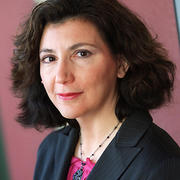
On Wednesday, February 3, President Barack Obama visited the Islamic Society of Baltimore, which was his first visit to a mosque in the U.S. while serving as president.
During his visit, Obama said that "An attack on one faith is an attack on all our faiths," and added, "We have to be consistent in condemning hateful rhetoric ... none of us can by bystanders to bigotry."
HDS communications reached out to Visiting Professor of Religion and Politics Jocelyne Cesari, director of Harvard's Islam in the West Program, for insight about Obama's visit, its significance, and why she believes it comes too late in his presidency.
HDS: What message does this send about the place of Muslims in America?
JC: It is a way to say that Muslims are a legitimate component of the American religious landscape, which is an important message in the current rise of Islamophobia. At the same time, it comes late, too late, since Obama has not expressed any strong opinion vis a vis Islam and Muslims in the U.S. over his two terms. It may be because some Americans still think he is a Muslim, and that he can be perceived as partial.
HDS: How will this be viewed by various Muslim groups outside the U.S.?
JC: It will not have a great impact outside the U.S. The Cairo speech at the beginning of his presidency has the potential to be much more influential, but it was not followed with any real policy implementing the principles enunciated in the speech.
HDS: What are the key differences between being a Muslim in America and being a Muslim in the Muslim world?
JC: Most Muslims live under authoritarian rule, which implies regulation and control in most aspects of life, including religion, so the major difference is freedom, freedom of speech, and freedom of religion.
HDS: Is there any historical precedent among heads of state in the western world for this type of visit to a mosque?
JC: Presidents in Western Europe have visited mosques at different occasions.
HDS: How does this visit differ from the one President George W. Bush made in 2001, days after the 9/11 attacks, during which he said "The face of terror is not the true faith of Islam. That’s not what Islam is all about. Islam is peace"?
JC: The visit by Bush was related to the beginning of the war on terror and hence aimed at reassuring Muslims that they would not be the target of this war simply for being Muslim. The visit by Obama takes place at a time of virulent political discourses against Islam, depicted as uncivil and illegitimate in the U.S. This visit will therefore be interpreted as a message of inclusion and recognition of Islam as part of American civil religion.
—by Michael Naughton
